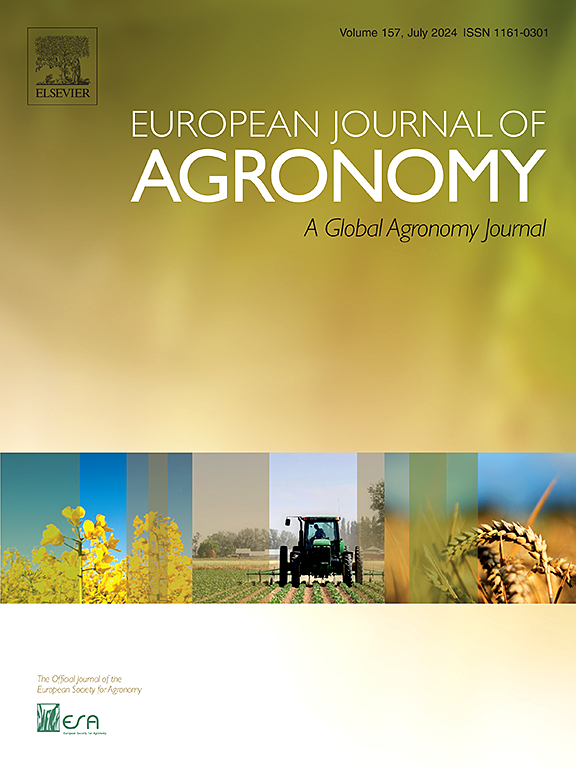整合机器学习与农业生态系统建模:现状和未来的挑战
IF 4.5
1区 农林科学
Q1 AGRONOMY
引用次数: 0
摘要
机器学习(ML),特别是深度学习(DL),由于能够提高计算密集型任务的效率,在农业生态系统建模界越来越受欢迎。通过回顾以前使用PRISMA技术的建模研究,我们提出了该领域ML应用的几个例子。强调了使用这些模型的潜力。不同类型的集成和模型构建方法分为基于过程的建模(PBMs)和数据驱动的建模(DDMs),它们模拟农业生态系统动力学的不同方面。虽然PBMs擅长捕捉复杂的生物物理和生物地球化学过程,但它们的计算量很大,可能并不总是可以用分析方法解决。为了应对这些挑战,机器学习(ML)技术,包括深度学习(DL),正越来越多地被整合到农业生态系统建模中。这种集成包括用数据驱动模型替换pbm,使用结合pbm和ML的混合模型,或者通过元建模构建pbm的简化版本。基于机器学习的元模型提供了计算效率,可以捕获复杂农业系统中复杂的模式和非线性关系。然而,诸如可解释性和数据需求等挑战仍然存在。这篇综述强调了解决差距和挑战的重要性,以充分发挥机器学习的潜力,确定最有希望的田间管理方式,促进可持续农业系统。它还强调了具体的考虑因素,如数据要求、可解释性、模型验证和可扩展性,以成功地将ML与农业中的PBMs集成,以及将ML与PBMs结合的变革潜力,特别是在将模拟从现场扩展到全球范围以及通过基于其应用的先进传感器技术简化数据收集过程方面。本文章由计算机程序翻译,如有差异,请以英文原文为准。
Integrating machine learning with agroecosystem modelling: Current state and future challenges
Machine learning (ML), especially deep learning (DL), is gaining popularity in the agroecosystem modelling community due to its ability to improve the efficiency of computationally intensive tasks. By reviewing previous modelling studies using the PRISMA technique, we present several examples of ML applications in this domain. The potential of using such models is highligthed. The different types of integration and model-building methods are categorized into process-based modelling (PBMs) and data-driven modelling (DDMs), which simulate different aspects of agroecosystem dynamics. While PBMs excel at capturing complex biophysical and biogeochemical processes, they are computationally intensive and may not always be solvable using analytical methods. To address these challenges, machine learning (ML) techniques, including deep learning (DL), are increasingly being integrated into agroecosystem modelling. This integration involves replacing PBMs with data-driven models, using hybrid models that combine PBMs and ML, or constructing simplified versions of PBMs through meta-modelling. ML-based meta-models offer computational efficiency and can capture intricate patterns and non-linear relationships in complex agricultural systems. However, challenges such as interpretability and data requirements remain. This review highlights the importance of addressing gaps and challenges to fully realize the potential of ML to identify the most promising ways of field management in promoting sustainable agricultural systems. It also highlights specific considerations such as data requirements, interpretability, model validation, and scalability for the successful integration of ML with PBMs in agriculture and the transformative potential of combining ML with PBMs, particularly in extending simulations from field to global scales and streamlining data collection processes through advanced sensor technologies based on their applications.
求助全文
通过发布文献求助,成功后即可免费获取论文全文。
去求助
来源期刊

European Journal of Agronomy
农林科学-农艺学
CiteScore
8.30
自引率
7.70%
发文量
187
审稿时长
4.5 months
期刊介绍:
The European Journal of Agronomy, the official journal of the European Society for Agronomy, publishes original research papers reporting experimental and theoretical contributions to field-based agronomy and crop science. The journal will consider research at the field level for agricultural, horticultural and tree crops, that uses comprehensive and explanatory approaches. The EJA covers the following topics:
crop physiology
crop production and management including irrigation, fertilization and soil management
agroclimatology and modelling
plant-soil relationships
crop quality and post-harvest physiology
farming and cropping systems
agroecosystems and the environment
crop-weed interactions and management
organic farming
horticultural crops
papers from the European Society for Agronomy bi-annual meetings
In determining the suitability of submitted articles for publication, particular scrutiny is placed on the degree of novelty and significance of the research and the extent to which it adds to existing knowledge in agronomy.
 求助内容:
求助内容: 应助结果提醒方式:
应助结果提醒方式:


